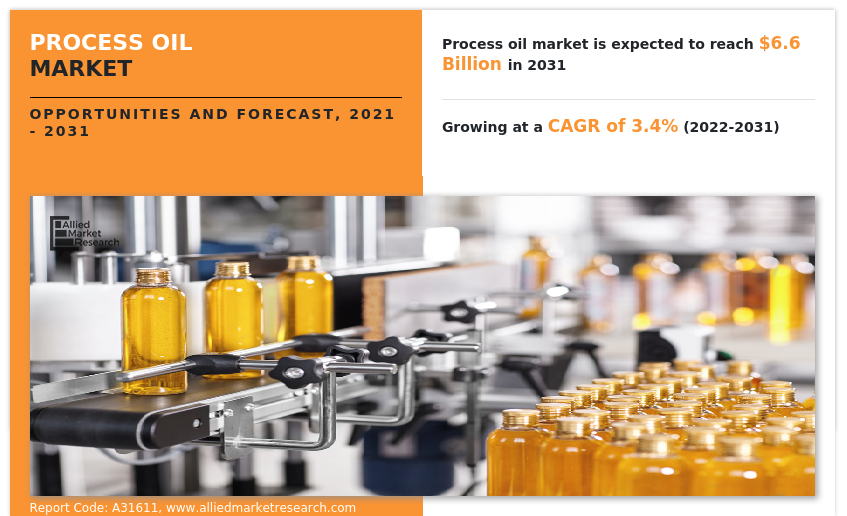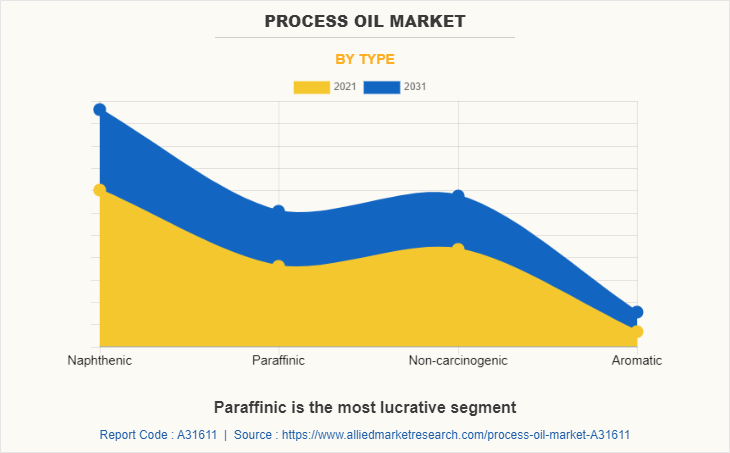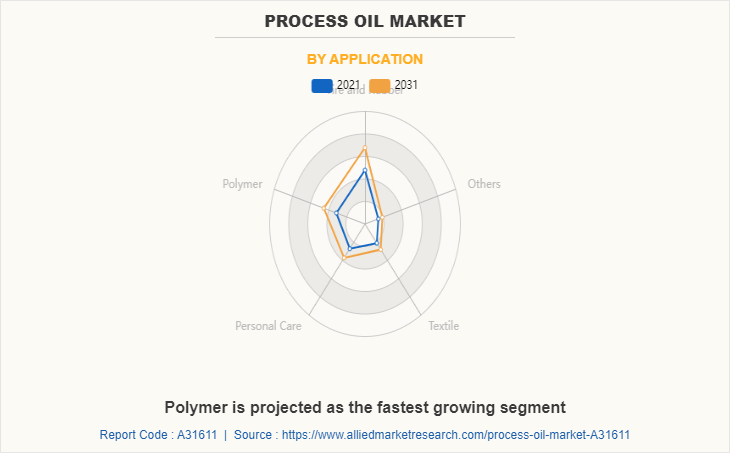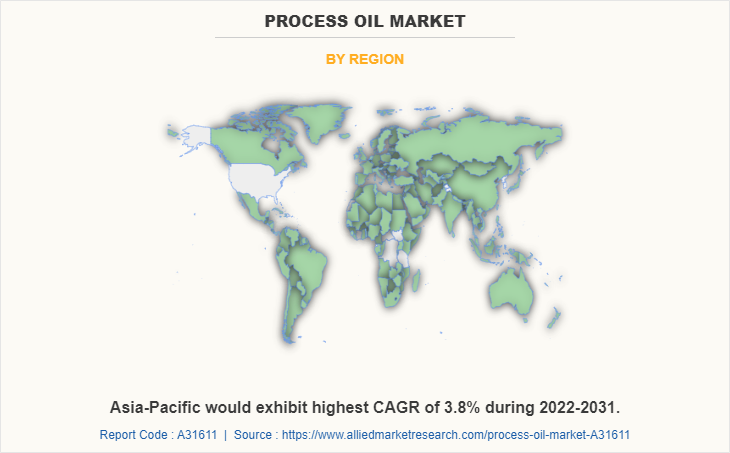Process Oil Market Research, 2031
The global process oil market size was valued at $4.7 billion in 2021, and is projected to reach $6.6 billion by 2031, growing at a CAGR of 3.4% from 2022 to 2031. The growing demand from the automotive industry and advancements in process oil production technologies are key drivers propelling the process oil market. The automotive sector relies heavily on process oils for applications such as lubricants, tires, and other vehicle components, driven by increasing vehicle production and rising demand for high-performance materials.

Process oils are extremely complex mixtures of aromatic, naphthenic, and paraffinic hydrocarbons that find applications either as a raw material or as an intermediate in various end use sectors including tire & rubber manufacturing, textile, polymer manufacturing, agriculture, and others. They are used in a wide variety of chemical and technical industries either as raw material components or as an aid to enhance the undergoing processes.
Introduction
Process oil is a type of petroleum-based oil used primarily as a raw material or additive in the manufacturing of various products such as rubber, plastics, and textiles. It serves as a lubricant, plasticizer, or solvent to enhance the processability, flexibility, and performance of materials during production. Process oils are categorized into different types based on their composition, including paraffinic, naphthenic, and aromatic oils, each offering unique properties suited for specific industrial applications. For instance, in the rubber industry, process oil improves the elasticity and durability of rubber products, while in plastics, it aids in molding and extrusion. Process oils are widely used across industries for their versatility and ability to improve the efficiency of manufacturing processes.
Report Key Highlighters:
- The report provides competitive dynamics by evaluating business segments, product portfolios, target market revenue, geographical presence, and key strategic developments by prominent manufacturers.
- The global process oil market is fragmented in nature among prominent companies such as Behran Oil Co., Chevron Corporation, Exxon Mobil Corporation, Gandhar Oil Refinery (India) Limited, HF Sinclair Corporation, Indian Oil Corporation Ltd., LODHA Petro, Process Oils Inc., Shell Plc., and Total Energies.
- The study contains qualitative information such as the market dynamics (drivers, restraints, challenges, and opportunities), key regulation analysis, pricing analysis, and Porters five forces analysis across North America, Europe, Asia-Pacific, and LAMEA.
- Latest trends in global process oil market such as undergoing R&D activities, regulatory guidelines, and government initiatives are analyzed across 16 countries in 4 different regions.
- More than 3,100 process oil-related product literatures, industry releases, annual reports, and other such documents of key industry participants along with authentic industry journals and government websites have been reviewed for generating high-value industry insights for the global process oil market.
Market Dynamics
The increasing awareness for cleanliness and hygiene has surged the demand for a wide range of personal care products. Process oil is widely used in a wide range of cosmetic and personal care products as a raw material component or solvent to further aid the solubility, oxidation stability, and emulsion capability. This is anticipated to increase the demand for process oil in the growing personal care and hygiene industry; thus, fueling the growth of the process oil market.
In addition, process oil is crystal-clear, ultra-stable, odor-free, and does not support microorganisms and thus cannot go rancid. These factors make it an ideal choice for use in personal care products, which in turn may further propel the growth of the process oil market during the forecast period.
Furthermore, increase in fashion consciousness among people and rise in adoption of western culture in both developed and developing countries such as the U.S., China, and India have led the fashion and textile industry to witness significant growth. This in turn has led the textile manufacturer to focus more on enhancing the quality of fabrics. Process oil is widely used for warp preparation in the textile industry. Moreover, it is used as a major machine lubricant, knitting oil, needle oil, conning, winding, and texturizing oils in textile industry. These factors altogether may surge the demand for market during the forecast period.
However, process oil is a petroleum-based product that is extracted from crude oil through distillation process. This makes them a highly volatile commodity owing to prices of crude oil/petroleum being controlled by oil traders, current oil supply, and future supply & demand. In addition, natural and man-made disasters have a great influence on price fluctuations of petroleum-based products. Therefore, increase in the prices of crude oil negatively affects the process oil vendors. The pricing of crude oil has a significant impact on the overall price of the component. Moreover, crude oil is traded on community exchange and owing to global economic fluctuations in the market; prices of these materials fluctuate occasionally. Thus, rise in prices of crude oil is expected to hamper the growth of the process oil market during the forecast period.
On the contrary, factors such as rise in population coupled with the emergence of advanced polymers have attracted customers toward using polymer-based products. Furthermore, polymers offer various significant advantages such as low cost, lightweight, high strength, and increased lifecycle that makes several end use sectors use polymers as a building block in product manufacturing. For instance, polymers are widely accepted in packaging industry owing to factors such as corrosion & moisture resistance, chemical stability, and others. Furthermore, there is a considerable demand for polymers from the healthcare industry owing to increase in demand for polymer-based biosensors, artificial body parts, and others. Process oils are widely used to make polymers and plastics that have a wide range of beneficial features, including stability, durability, hardness, and scratch resistance. Furthermore, process oil is added to improve and control the melt flow rate of finished polymers. These factors have surged the popularity of process oil among the polymer manufacturing sector; thus, creating lucrative opportunities for the market.
Segment Overview:
The process oil market is segmented into type, application, and region. On the basis of type, the market is categorized into naphthenic, paraffinic, non-carcinogenic, and aromatic. As per application, it is classified into tire & rubber, polymer, personal care, textile, and others. Region wise, the market is studied across North America, Europe, Asia-Pacific, and LAMEA.
Process Oil Market By Type

In 2021, the naphthenic segment was the largest revenue generator, and is anticipated to grow at a CAGR of 3.4% during the forecast period. Naphthenic process oils are hydrogenated and highly refined oils with light color and low sulfur content. It has a good balance between low volatility and solvency that makes them highly preferred over paraffinic process oils. The utilization of naphthenic process oils for applications such as emulsion agents, industrial explosives, antifoam agents, and demoulding agents is the major key market trend in the global process oil market.
Furthermore, the increasing R&D activities in various chemical manufacturing sectors have surged the potential application of naphthenic process oil for use as a major emulsifier during chemical synthesis. This may act as one of the key drivers responsible for the growth of the market for naphthenic type. Moreover, factors such as rise in sales of automotive vehicles and growing demand for metals in various end-use sectors, including construction, aerospace, power, and others have surged the demand for naphthenic process oils used as metalworking fluids in metal processing industries. This may foster the demand for process oil market for naphthenic type.
Process Oil Market By Application

By application, the tire and rubber segment dominated the global market in 2021, and is anticipated to grow at a CAGR of 3.5% during forecast period. Factors such as rise in demand for consumer goods, accelerating sales of passenger vehicles, and increase in original equipment manufacturers (OEMs) have surged the demand for tires where process oil is used as a solvent during tires manufacturing. This may act as one of the key drivers responsible for the growth of the process oil market for tire and rubber application. Furthermore, both developed and developing economies are constantly engaged in manufacturing advanced aircrafts with modern armor facilities. This has surged the demand for high quality tires that is capable of handling high pressures. This factor may augment the growth of the market for tire & rubber applications.
Process Oil Market By Geography

The Asia-Pacific process oil market size is projected to grow at the highest CAGR during the forecast period, owing to the fact that China's polymer manufacturing sector is one the largest sector in the world. According to a report published by Plastics Europe, China accounted for 32% share of the global plastic production by volume in 2021. This has forced the process oil manufacturers to increase their manufacturing capacities for producing high quality process oil used to improve and control the melt flow rate of finished polymers. This may act as one of the key drivers responsible for the growth of the market.
Furthermore, the personal hygiene & beauty sector in India is witnessing a significant growth owing to increasing number of newborns and rise in awareness regarding self-beauty and self-grooming activities where process oil is widely used to produce various cosmetic formulations. For instance, according to a report published by United Nations Children's Fund (UNICEF), around 67,385 babies are born in India, that’s one sixth of the world’s child births. This is anticipated to increase the sales of process oil among the growing personal care & hygiene sector; thus fueling the growth of the process oil market in Asia-Pacific.
Competitive Analysis:
The global process oil market profiles leading players that include Behran Oil Co., Chevron Corporation, Exxon Mobil Corporation, Gandhar Oil Refinery (India) Limited, HF Sinclair Corporation, Indian Oil Corporation Ltd., LODHA Petro, Process Oils Inc., Shell Plc., and Total Energies. The global process oil market report provides in-depth competitive analysis as well as profiles of these major players.
Industry Trend
The process oil market is seeing steady growth, driven by rising demand across industries such as rubber, plastics, and textiles. In the rubber sector, the automotive industry’s expansion is a key factor, as process oil is crucial for manufacturing tires and other components. According to the International Energy Agency (IEA), global vehicle production is expected to grow by 5% in 2024, boosting the demand for process oils in rubber compounding.
In India, the government’s *Make in India* initiative is promoting domestic manufacturing, especially in the automotive and textile sectors. This is significantly increasing the need for process oils in industrial production. The Indian Ministry of Commerce reported a 12% rise in rubber and plastic production in 2023, directly impacting the demand for process oils used in these sectors.
Globally, regulatory trends are also shaping the market. For instance, the European Union’s *REACH* regulations limit the use of high aromatic oils due to environmental concerns, leading to increased demand for safer paraffinic and naphthenic process oils. As industries focus on eco-friendly solutions, the process oil market is expected to grow rapidly, driven by both industrial expansion and regulatory shifts.
Key Benefits For Stakeholders
This report provides a quantitative analysis of the market segments, current trends, estimations, and dynamics of the process oil market analysis from 2021 to 2031 to identify the prevailing process oil market opportunities.
- The market research is offered along with information related to key drivers, restraints, and opportunities.
- Porter's five forces analysis highlights the potency of buyers and suppliers to enable stakeholders make profit-oriented business decisions and strengthen their supplier-buyer network.
- In-depth analysis of the process oil market segmentation assists to determine the prevailing market opportunities.
- Major countries in each region are mapped according to their revenue contribution to the global market.
- Market player positioning facilitates benchmarking and provides a clear understanding of the present position of the market players.
- The report includes the analysis of the regional as well as global process oil market trends, key players, market segments, application areas, and process oil market growth strategies.
Process Oil Market Report Highlights
| Aspects | Details |
| Market Size By 2031 | USD 6.6 billion |
| Growth Rate | CAGR of 3.4% |
| Forecast period | 2021 - 2031 |
| Report Pages | 245 |
| By Type |
|
| By Application |
|
| By Region |
|
| Key Market Players | Process Oils Inc., Gandhar Oil Refinery (India) Limited, Indian Oil Corporation Ltd, Behran Oil Co., Exxon Mobil Corporation, LODHA Petro, HF Sinclair Corporation, Chevron Corporation, Total Energies, Shell Plc. |
Analyst Review
The global process oil market is expected to exhibit high growth potential during the forecast period. Process oils are used in a variety of end-use sectors, such as plastic & polymer, rubber manufacturing, tire manufacturing, and others as external lubricant, catalyst carrier, and softener. The tire manufacturing sector that requires enhanced traction and weather resistance of tires can be accomplished with the use of process oil.
In addition, process oil possess excellent significant properties, such as outstanding lubrication, chemical stabilization, and water repellency that make it best-suited for use in the cosmetic sector for producing various cosmetic formulations. Furthermore, process oil serves as an excellent formulation and is used as a major intermediate in producing a wide range of polymers. Furthermore, factors such as high onset action and efficiency have surged the popularity of process oil in the polymer manufacturing sector. The sustained economic growth and development of the plastics & polymer sector have increased the popularity of process oil.
The rise in demand from the personal care sector and robust growth in the textile sector are the major upcoming trends of the process oil market in the world.
The leading applications of process oil market includes tire & rubber, polymer, personal care, textile, and others.
Asia-Pacific is the largest regional market for process oil. This is attributed to the fact that China's polymer manufacturing sector is one the largest sector in the world. Furthermore, the personal hygiene & beauty sector in India is witnessing a significant growth owing to increasing number of newborns and rise in awareness regarding self-beauty and self-grooming activities where process oil is widely used to produce various cosmetic formulations.
The global process oil market is projected to reach $6.6 billion by 2031, growing at a CAGR of 3.4% from 2022 to 2031.
The global process oil market profiles leading players that include Behran Oil Co., Chevron Corporation, Exxon Mobil Corporation, Gandhar Oil Refinery (India) Limited, HF Sinclair Corporation, Indian Oil Corporation Ltd., LODHA Petro, Process Oils Inc., Shell Plc., and Total Energies.
Loading Table Of Content...


